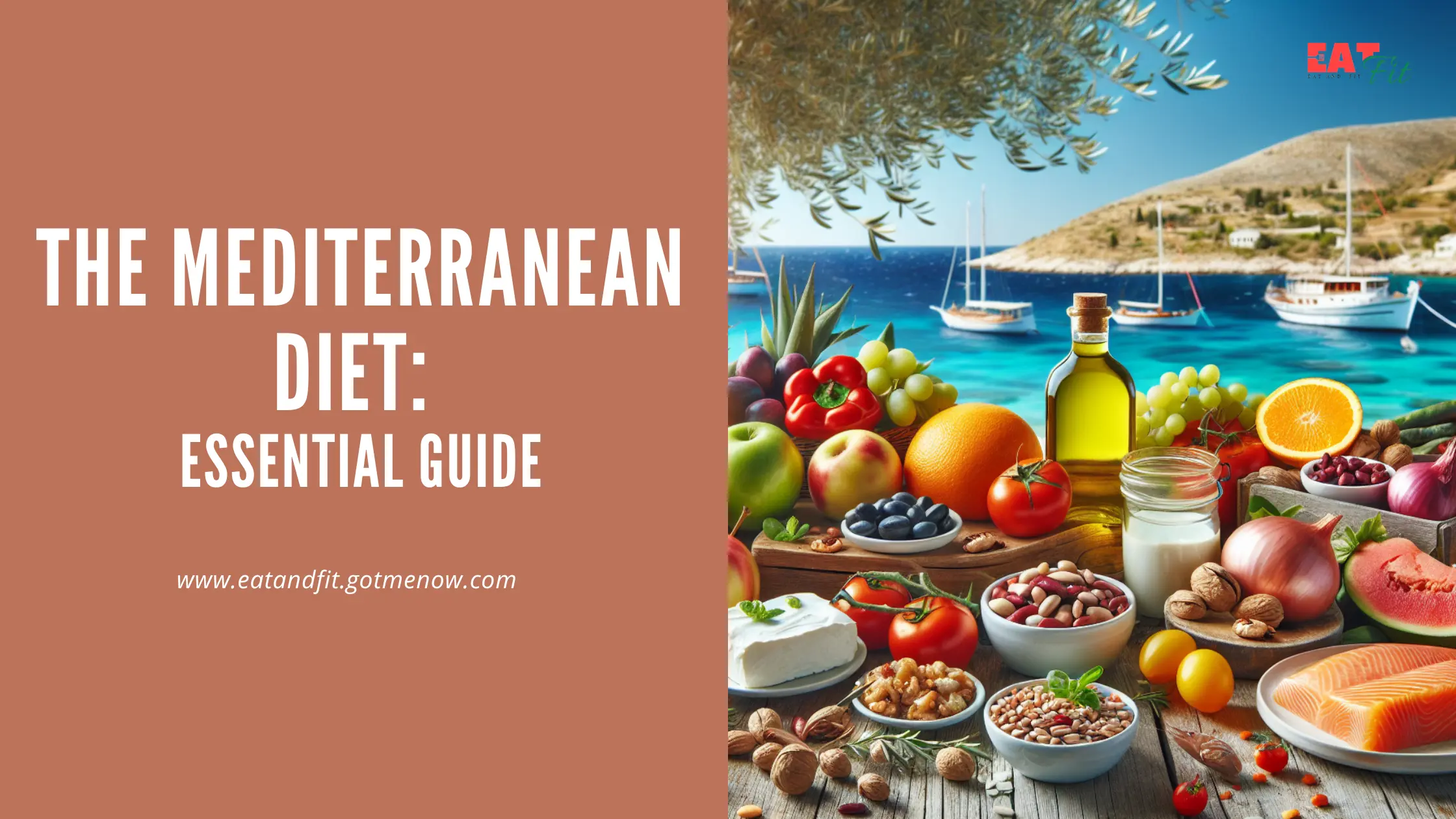The Mediterranean Diet: Everything You Need to Know

Table of Contents
- Introduction
- Foundation of the Diet
- Seafood and Dairy
- Sugar and Refined Grains
- Animal-Based Foods
- Alcohol Moderation
- High-Quality Ingredients
- Conclusion
- FAQ
Introduction
The Mediterranean Diet, renowned for its health benefits and rich culinary tradition, is not merely a dietary regimen but a way of life. Rooted in the eating habits of countries bordering the Mediterranean Sea, this diet emphasizes fresh fruits, vegetables, whole grains, legumes, nuts, and olive oil, while minimizing red meat and processed foods. Its allure lies not only in its delicious flavors but also in its proven ability to promote heart health, manage weight, and reduce the risk of chronic diseases. With a focus on balance, variety, and simplicity, the Mediterranean Diet offers a pathway to vibrant health and longevity.
Foundation of the Diet
When it comes to the Mediterranean Diet, the foundation lies in focusing on plant-based foods. This means that each meal should include a variety of vegetables and fruits, which are rich in essential vitamins, minerals, and fiber. These plant-based foods not only provide necessary nutrients but also contribute to improving body composition and reducing obesity.
The Benefits of a Mediterranean Diet: Reducing Heart Disease Risk and Promoting Healthy Eating
In addition to vegetables and fruits, the Mediterranean Diet also emphasizes the inclusion of legumes, pulses, nuts, whole grains, and seeds. Legumes, such as lentils and chickpeas, are excellent sources of plant-based protein and fiber. Nuts, whole grains, and seeds provide healthy fats, antioxidants, and additional fiber, all of which are beneficial for overall health.
Another important aspect of the Mediterranean Diet is the use of healthy plant-based oils. Extra virgin olive oil, known for its anti-inflammatory properties, is a staple in this diet. Other plant-based oils, such as avocado oil, can also be used as a non-inflammatory alternative. These oils are rich in monounsaturated fats, which are heart-healthy and help to reduce the risk of cardiovascular diseases.
In summary, the foundation of the Mediterranean Diet involves focusing on plant-based foods, including a variety of vegetables and fruits, incorporating legumes, pulses, nuts, whole grains, and seeds, and utilizing healthy plant-based oils. By following these principles, you can enjoy a diverse and nutritious diet that promotes overall health and well-being.
Seafood and Dairy
Seafood plays a vital role in the Mediterranean Diet due to its numerous health benefits. Incorporating seafood into your meals at least twice a week can provide you with essential omega-3 fatty acids, high-quality protein, and various vitamins and minerals. These nutrients contribute to a healthy heart, improved brain function, and reduced inflammation. Recommended seafood options include tuna, salmon, sardines, mussels, shrimp, and scallops.

When it comes to dairy, portion control is key. While yogurt and cheese are enjoyed in the Mediterranean Diet, it is important to consume them in moderation. This may mean eating smaller portions of dairy than you are used to. By practicing portion control, you can still enjoy the benefits of dairy while maintaining a balanced diet. Yogurt is a great source of probiotics, calcium, and protein, while cheese provides essential nutrients like calcium, vitamin B12, and phosphorus.
Additionally, it is important to choose high-quality ingredients and food items. Opt for fresh and organic dairy products whenever possible to ensure you are getting the most nutritional value from your dairy choices. By prioritizing high-quality ingredients, you can enhance the overall taste and health benefits of your Mediterranean meals.
So, go ahead and incorporate seafood into your meals a few times a week to reap its numerous health benefits. And don’t forget to enjoy yogurt and cheese in moderation while focusing on portion control. The Mediterranean Diet offers a delicious and nutritious way to savor the flavors of the Mediterranean region while promoting a healthy lifestyle.
Sugar and Refined Grains
Sugar and refined grains can have negative effects on our health and well-being. These food items contribute to inflammation and oxidative stress in the body, which can increase the risk of chronic diseases.
When we consume sugar and refined grains, our bodies experience a spike in blood sugar levels. This can lead to inflammation, which is a key driver of many chronic diseases, such as heart disease, diabetes, and certain types of cancer. Additionally, these foods can cause oxidative stress, which can damage cells and contribute to the aging process.
Another concern with sugar and refined grains is their impact on weight gain. These foods are often high in calories and low in nutrients, which can lead to overeating and weight gain over time. Excess weight gain is associated with an increased risk of chronic health problems, including heart disease, type 2 diabetes, and certain types of cancer.
To reduce the negative effects of sugar and refined grains, it’s important to limit our intake of these foods. Instead, we can focus on consuming whole, unprocessed foods that are rich in nutrients and fiber. This includes choosing whole grains, such as quinoa, brown rice, and whole wheat bread, over refined grains like white rice and white bread.
7 Simple Tips to Jump Start Eating the Mediterranean Way Every Day
We can also reduce our sugar intake by opting for natural sweeteners, such as honey or maple syrup, in moderation. It’s also important to be mindful of hidden sugars in processed foods, such as sugary drinks, desserts, and snacks. Reading food labels can help us identify added sugars and make more informed choices.
In summary, sugar and refined grains can have negative effects on our health, including inflammation, weight gain, and chronic health problems. By reducing our intake of these foods and focusing on whole, unprocessed options, we can support our overall health and well-being.
Animal-Based Foods
When it comes to the Mediterranean Diet, it’s important to understand the role of animal-based foods. While the focus is on plant-based foods, there is still room for limited consumption of certain animal-based foods.
Red meat, such as beef and pork, should be consumed in moderation. This is because excessive consumption of red meat has been linked to an increased risk of heart disease, cancer, and other health issues. Limiting your intake of red meat can help reduce these risks and promote better overall health.
If you do choose to consume red meat, it’s recommended to combine it with plant-based foods. This means including a variety of vegetables, fruits, legumes, and whole grains in your meal. By combining red meat with plant-based foods, you can create a more balanced and nutritious meal.
When it comes to acceptable animal-based foods in the Mediterranean Diet, chicken and eggs are good options. Chicken is a lean source of protein and can be prepared in a variety of ways to add flavor and variety to your meals. Eggs are also a great source of protein and can be enjoyed in a variety of dishes.
Reducing your consumption of animal-based foods, especially red meat, can have several benefits. It can help lower your intake of saturated fats, which are associated with an increased risk of heart disease. It can also help reduce your carbon footprint and contribute to a more sustainable food system.
By focusing on plant-based foods and limiting your intake of animal-based foods, you can enjoy the benefits of the Mediterranean Diet while promoting better overall health and well-being.
Alcohol Moderation
Alcohol consumption is a part of the Mediterranean Diet, but it is important to practice moderation for optimal health benefits. Here are some key considerations:
Role of wine in the Mediterranean Diet
Wine is a traditional component of the Mediterranean Diet and is often enjoyed in moderation with meals. Red wine, in particular, contains antioxidants like resveratrol that have been linked to various health benefits, including heart health and reduced inflammation.
Recommended alcohol consumption limits
It is important to follow recommended alcohol consumption limits to avoid potential negative effects on health. The guidelines suggest that women should not have more than one 5-ounce glass of wine per day, and men should limit their intake to no more than two 5-ounce glasses per day.
Health considerations for women
Women should be mindful of their alcohol intake due to factors such as body weight and metabolism. Excessive alcohol consumption can increase the risk of breast cancer and other health issues. It is important to prioritize overall health and consult with a healthcare professional if you have any concerns.
Health considerations for men
Men should also be aware of their alcohol consumption and aim to stay within the recommended limits. Excessive alcohol intake can increase the risk of liver disease, cardiovascular problems, and other health issues. It is important to prioritize overall health and moderation.
The Benefits of the Mediterranean Diet: A Guide to Healthy Living
By practicing alcohol moderation and staying within the recommended limits, you can enjoy the potential health benefits of wine while minimizing the risks associated with excessive alcohol consumption. As always, it is important to listen to your body and make choices that align with your individual health needs and goals.
High-Quality Ingredients
Choosing high-quality ingredients is crucial when following the Mediterranean Diet. Here’s why:

Importance of choosing high-quality ingredients
High-quality ingredients provide more nutritional value and contribute to your overall health. They are packed with essential vitamins, minerals, and antioxidants that support your well-being.
Freshness and health benefits
Opting for fresh ingredients ensures that you are getting the maximum nutrient content from your food. Fresh fruits, vegetables, and seafood contain higher levels of vitamins and minerals compared to their processed or frozen counterparts.
Avoiding poor quality ingredients
Poor-quality ingredients, such as processed foods, can be high in unhealthy additives like preservatives, artificial colors, and trans fats. These ingredients have been linked to various health issues, including heart disease and obesity.
Impact on taste and overall experience
High-quality ingredients enhance the taste and overall experience of your meals. Fresh herbs, spices, and seasonal produce add vibrant flavors and textures to your dishes, making them more enjoyable.
By choosing high-quality ingredients, you can ensure that your Mediterranean meals are not only nutritious but also delicious. So, prioritize freshness, opt for organic options whenever possible, and savor the flavors of high-quality ingredients in your Mediterranean dishes.
Conclusion
The Mediterranean Diet is a well-rounded and inclusive approach to eating that offers a wide variety of health benefits. By following the principles of this diet, you can improve your body composition, reduce the risk of cardiovascular diseases, control blood sugar levels, and support overall health and well-being.
Summary of the Mediterranean Diet
The foundation of the Mediterranean Diet lies in focusing on plant-based foods, including vegetables, fruits, legumes, pulses, nuts, whole grains, and seeds. Healthy plant-based oils, such as extra virgin olive oil, are also a key component.
Seafood, yogurt, and cheese can be enjoyed in moderation, while sugar and refined grains should be limited. Red meat consumption should be minimized, and alcohol should be consumed in moderation.
Commitment to a healthier lifestyle
By adopting the Mediterranean Diet, you are committing to a healthier lifestyle. By prioritizing high-quality ingredients, portion control, and moderation, you can make positive changes to your eating habits.
Long-term benefits
The Mediterranean Diet offers numerous long-term benefits, including weight management, reduced risk of chronic diseases, improved heart health, and increased overall well-being.
Thank you for watching and subscribing
We appreciate your support and hope that you found this information helpful. Thank you for watching our video and for subscribing to our channel. Stay tuned for more informative content!
FAQ
Is the Mediterranean Diet suitable for vegetarians or vegans?
Yes, the Mediterranean Diet is suitable for vegetarians and can easily be adapted for vegans. The diet emphasizes plant-based foods, including vegetables, fruits, legumes, nuts, whole grains, and seeds, which are all suitable for a vegetarian or vegan lifestyle. By incorporating these foods into your diet, you can still enjoy the health benefits of the Mediterranean Diet without consuming animal products.
How does the Mediterranean Diet benefit heart health?
The Mediterranean Diet is known for its positive impact on heart health. The diet encourages the consumption of healthy fats, such as those found in olive oil and nuts, which can help reduce LDL cholesterol levels and lower the risk of heart disease. Additionally, the diet is rich in fruits, vegetables, and whole grains, which provide essential vitamins, minerals, and antioxidants that support heart health. The combination of these factors makes the Mediterranean Diet beneficial for maintaining a healthy heart.
Can the Mediterranean Diet help with weight loss?
Yes, the Mediterranean Diet can help with weight loss. The diet focuses on whole, unprocessed foods that are nutrient-dense and filling. By incorporating a variety of fruits, vegetables, whole grains, and lean proteins into your meals, you can feel satisfied while consuming fewer calories. Additionally, the Mediterranean Diet promotes portion control and limits the intake of sugary and processed foods, which can contribute to weight gain. By following the principles of the Mediterranean Diet, you can achieve weight loss sustainably and enjoyably.
Are there any risks or drawbacks to the Mediterranean Diet?
The Mediterranean Diet is generally safe and beneficial for most individuals. However, it is important to note that the diet may not be suitable for everyone, especially those with specific dietary restrictions or medical conditions. For example, individuals with nut allergies may need to modify their diet to exclude nuts. Additionally, individuals with certain medical conditions, such as kidney disease, may need to monitor their intake of certain foods, such as salt and potassium. It is always recommended to consult with a healthcare professional or registered dietitian before making any significant changes to your diet.








